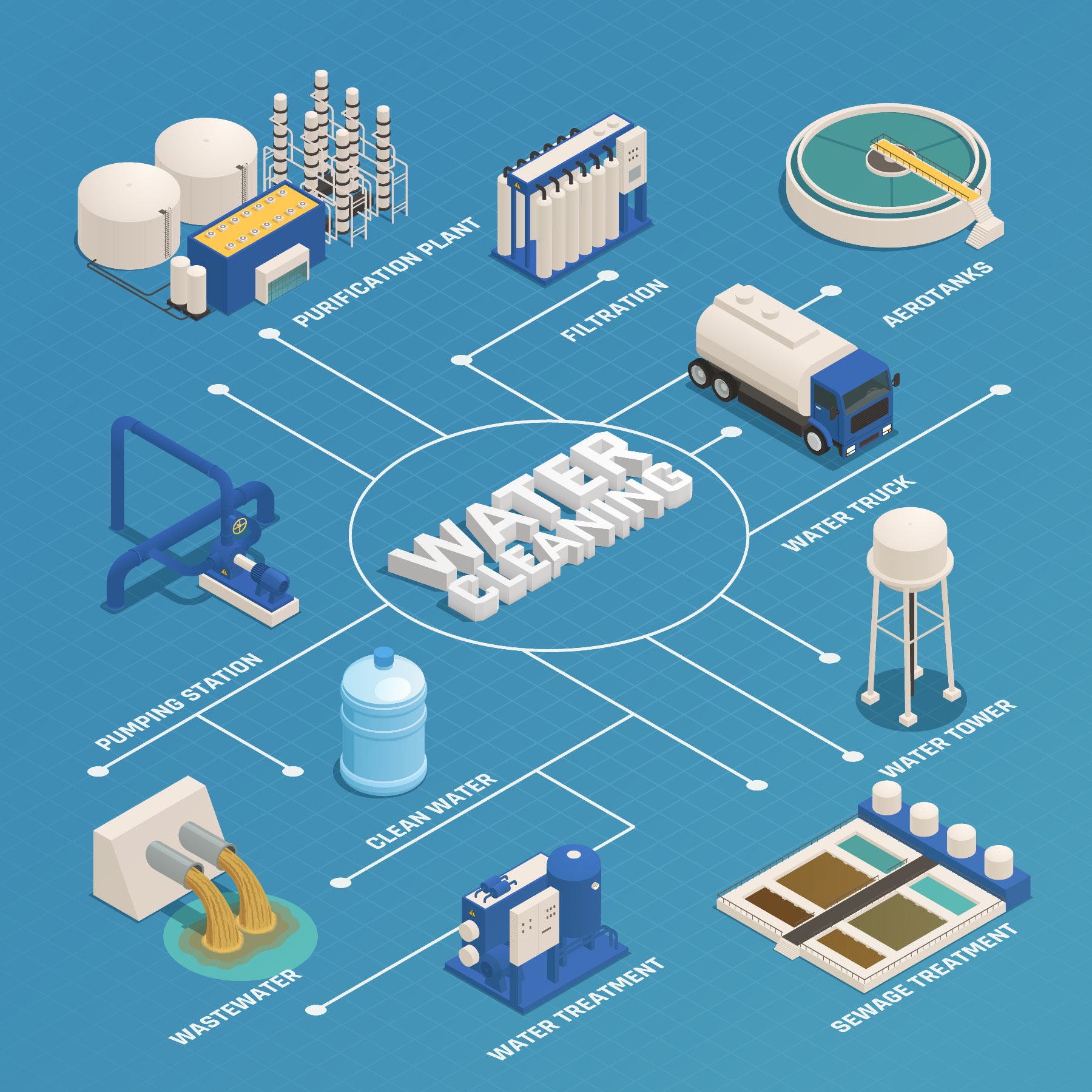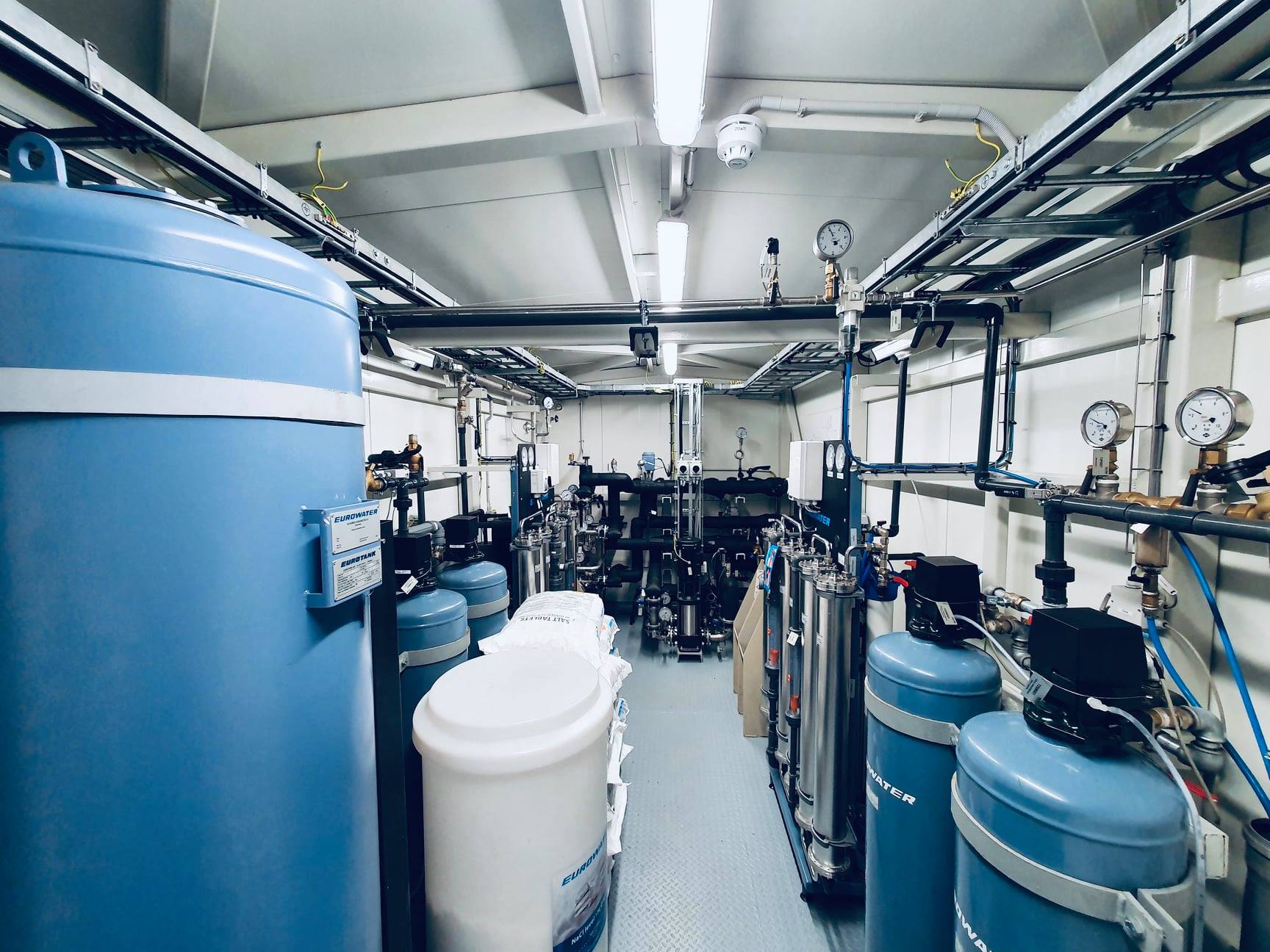Водата е безценен ресурс, който поддържа живота, което прави достъпа до чиста и безопасна питейна вода критична глобална грижа. Пречиствателните станции играят жизненоважна роля за гарантиране, че водата, която консумираме, не съдържа замърсители и е безопасна за общественото здраве. Значението им в нашия живот не може да бъде надценено, защото те носят огромната отговорност за пречистването на водата от множество източници, вариращи от реки и езера до подпочвени води. По този начин те гарантират, че са в крак с безопасността и качеството, определени от регулаторните органи, като гарантират, че водата, на която разчитаме за нашите ежедневни нужди, отговаря на най-високите стандарти за чистота.
Пречиствателните станции за сладка вода са инфраструктура, предназначена да пречиства и поддържа качеството на водата от различни източници, преди тя да достигне домовете ни. Те са оборудвани с машини, технологии и процеси за обработка, насочени към отстраняване на примеси, замърсители и микроорганизми от суровата вода. Пречиствателните станции са важни за защитата на общественото здраве, насърчаването на безопасността на околната среда и гарантирането, че чистата и годна за пиене вода е достъпна за всички.
Разбиране на значението на пречиствателните станции
Ролята на пречиствателните станции надхвърля чистотата на водата – те са защитниците на първа линия срещу болести и замърсители, които иначе биха могли да причинят сериозни щети на нашето здраве. Тези съоръжения са решаваща част от защитата срещу микроорганизми, които могат да се съдържат в необработена вода, включително вредни бактерии, вируси и паразитни организми. Като подлагат водата на серия от процеси на пречистване, те ефективно неутрализират тези заплахи, като гарантират, че всяка глътка, която поемаме, не е вредна.
Пречиствателните станции ни позволяват надежден достъп до чиста вода за големи и малки общности. Независимо дали в оживени градски центрове или отдалечени райони, тези инсталации свързват пропастта между водоизточниците и крана, доставяйки безопасна вода. Те са важна част от насърчаването на общественото здраве, подпомагането на икономическия растеж и подобряването на цялостното качество на живот на безброй хора.
Различни процеси на пречистване на водата
Процесът на превръщане на сурова вода в чиста питейна вода е сложна и многостранна операция, извършвана от пречиствателни станции. Тези съоръжения разполагат с широк набор от процедури, всяка от които играе решаваща роля за пречистването на водата и гарантирането, че тя е чиста от примеси и замърсители. Този процес на пречистване на водата включва филтриране, утаяване, коагулация и дезинфекция.
Филтрирането, например, служи като първоначална защитна част от този процес на пречистване. Това води до преминаване на водата през сложни слоеве от материали, като пясък, чакъл и активен въглен. Тази система действа като прецизно сито, улавящо суспендирани частици и примеси, които влияят върху бистротата и безопасността на водата.
Утаяването играе друга важна роля със своя процес, задвижван от гравитацията. В границите на резервоар за утаяване водата се оставя да се утаи, осигурявайки възможност на по-тежки частици, предварително суспендирани във водата, да се натрупат на дъното на резервоара. Този нежен процес на разделяне допълнително подобрява качеството на водата чрез премахване на всички останали примеси, които може да са пропуснати от първоначалното филтриране.
Коагулацията, напротив, въвежда химическо усъвършенстване на процеса. Това включва внимателно прилагане на химикали за пречистване на водата, които действат като молекулярни свързващи вещества, улавят примесите и ги правят по-податливи на отстраняване. Тези коагуланти инициират деликатна химическа реакция във водата, карайки микроскопичните частици да се агрегират и да образуват по-големи екстрахируеми маси. Тази химическа интервенция почиства водата допълнително за последните етапи на процеса на пречистване на водата.
Научете повече за решенията за пречистване на водата

Как да третираме водата?
Знаем, че суровата вода може да не е безопасна, но как се третира водата? Това е многостранен процес, който започва със събирането на сурова вода от нейния източник. Специфичният метод за пречистване трябва да се извърши на водоизточника, независимо дали е за повърхностни води, подземни води или за пречистване на вода от кладенец. Повърхностните води често изискват по-цялостно третиране поради потенциални замърсители, докато подпочвените води се филтрират естествено до известна степен.
Първоначалната стъпка в пречистването на всяка вода включва филтриране, при което големи отломки и предмети се отстраняват, за да се предотврати повреда на оборудването. След скрининга водата се подлага на коагулация и флокулация, при които се въвеждат химикали за обработка на водата, за да се свържат фините частици, което ги прави по-лесни за отстраняване. След това водата навлиза във фазата на утаяване, където остава, за да утаи по-тежките частици. Този процес допълнително избистря водата, като премахва всички останали примеси, които може да са избегнали по-ранните етапи. Комбинацията от тези стъпки на пречистване гарантира, че водата е ефективно подготвена за следващите фази на пречистване. Това е най-добрият начин за третиране на вода от кладенец, подземна вода или повърхностна вода.
Ролята на хлора и други химикали
Може би се чудите какви химикали се използват за пречистване на водата. Един от най-разпространените методи за дезинфекция на водата в пречиствателните станции е използването на хлор. Третирането на вода с хлор е много ефективно за премахване на бактерии, вируси и други микроорганизми, присъстващи във водата, като гарантира нейната безопасност за консумация. В допълнение към хлора, различни други химикали, използвани за пречистване на вода, се използват за регулиране на нивата на pH на водата и контролиране на разпространението на водорасли и бактерии. Тези химикали са от съществено значение за гарантиране, че пречистената вода отговаря на регулаторните стандарти и е годна за консумация от човека.
Внимателният подбор и прилагане на тези химикали са от жизненоважно значение за успеха на пречистването на водата, тъй като те не само допринасят за безопасността на водата, но и допринасят за нейното цялостно качество, вкус и миризма, позволявайки на хората да получават вода, която е едновременно здравословна и вкусни за употреба и консумация.
Справяне с предизвикателствата при обработката на твърда вода и желязо
Пречистването на твърдата вода е от съществено значение за предотвратяване на котления камък в тръбите и уредите. Пречиствателните станции използват процеси като йонообмен или омекотяване на водата, за да смекчат този проблем. Йонният обмен включва преминаване на водата през смоли, които обменят калциеви и магнезиеви йони с натриеви йони, ефективно омекотявайки водата и . Това предотвратява натрупването на котлен камък и удължава живота на уреди, като бойлери и съдомиялни машини.
Третирането на желязо е друго предизвикателство при обработката на сурова вода. Третирането на желязо и железни съединения в кладенчова вода е от съществено значение, тъй като желязото във водата може да доведе до оцветяване и неприятен вкус. Но как да обработим желязото във водата? Това включва процеси на окисление и филтриране за отстраняване на железни частици и предотвратяване на обезцветяване. Окисляването обикновено се постига чрез добавяне на въздух или химикали към водата, което кара желязото да се утаи и да образува твърди частици, които се отстраняват чрез филтриране.
Модерни системи и решения за пречистване на вода
Има нови технологични постижения за по-чисти и по-безопасни решения.
Често наричани „интелигентни“ системи за пречистване на вода. Тези иновации имат интегрирана автоматизация и мониторинг в реално време, пренасяйки пречистването на водата в дигиталната ера. Оборудвани със сензори и усъвършенствани системи за управление, те наблюдават и се адаптират, за да осигурят оптимална ефективност. Това не само гарантира доставката на вода, която отговаря на стандартите за чистота на общностите, но също така намалява отпадъците и оперативните разходи, съобразявайки се с отдадеността на устойчивите практики.
Включвайки усъвършенствани технологии за филтриране, като мембранна филтрация и ултрафилтрация, тези системи гарантират, че няма да оставят място за грешки, когато става въпрос за качеството на водата. Тези технологии са доказали, че имат отлични резултати при елиминиране на замърсители на микроскопично ниво, гарантирайки, че третираната вода постоянно отговаря на нормативните изисквания.
Как да планирате, изградите и поддържате системи за пречистване на вода
Планирането, изграждането и поддръжката на решения за пречистване на водата се нуждаят от експертиза на високо ниво. Ключът е в дизайна и отдадеността на редовната поддръжка, която гарантира непрекъснато снабдяване с чиста вода. Специалистите по пречистване на питейна вода гарантират, че тези системи работят с максимална ефективност.
Правилното планиране започва с цялостна оценка на водоизточника, като се вземат предвид фактори като качеството на водата, търсенето и наличните специфични замърсители. Фазата на проектиране включва избор на необходимите методи за обработка и инженеринг на система, съобразена с уникалните нужди на общността или съоръжението. Изграждането на система за пречистване на вода трябва да отговаря на стандартите за контрол на качеството, следвайки протоколите за безопасност и екологичните разпоредби. Следването на тези конкретни указания и стъпки е начинът, по който третираме водата.
През последните години автоматизацията революционизира практиките за поддръжка. Усъвършенстваните системи за наблюдение предоставят събиране на данни в реално време, което позволява на специалистите по водоподготовка да откриват и разрешават проблеми, преди те да станат критични. Стратегиите за прогнозна поддръжка са рентабилен подход, свеждащ до минимум проблемите и удължаващ живота на оборудването.
FILTER захранва индустрията за пречистване на вода
Чистата вода е важна част от човешкото благополучие и добре работещото общество. Тя играе незаменима роля в поддържането на общественото здраве, подпомагането на селското стопанство, поддържането на екосистемите и захранването на промишлените процеси. Достъпът до чиста вода е не само удобство – тя е основно човешко право и жизненоважен ресурс за всички нас. Чистата вода предпазва общностите от болести, пренасяни от вода, позволява процъфтяването на селското стопанство и осигурява основа за икономическо развитие, поддържайки здравето на екосистемите от своя страна е от полза за всички нас.
Filter стои зад подходящите решения за пречистване на вода. Нашата широка гама от продукти за пречистване на вода предлага системи за филтриране, химически добавки и иновативни технологии, които подобряват процесите на пречистване на питейната вода. Ние се ангажираме с устойчивост и високи постижения, внасяйки иновации в сектора за пречистване на водата. Filter има за цел да гарантира, че всеки има достъп до пречистена вода. Ако се нуждаете от помощ при пречистването на водата, нашите експерти са тук, за да Ви помогнат на всяка стъпка по пътя. Ние сме специализирани в проектирането, изграждането и инсталирането на индивидуални решения за пречистване на водата, за да отговорим на Вашите специфични нужди. Свържете се с нас днес, за да разберете как нашият опит може да подпомогне Вашите усилия за пречистване на водата и да допринесе за по-здравословно бъдеще.



